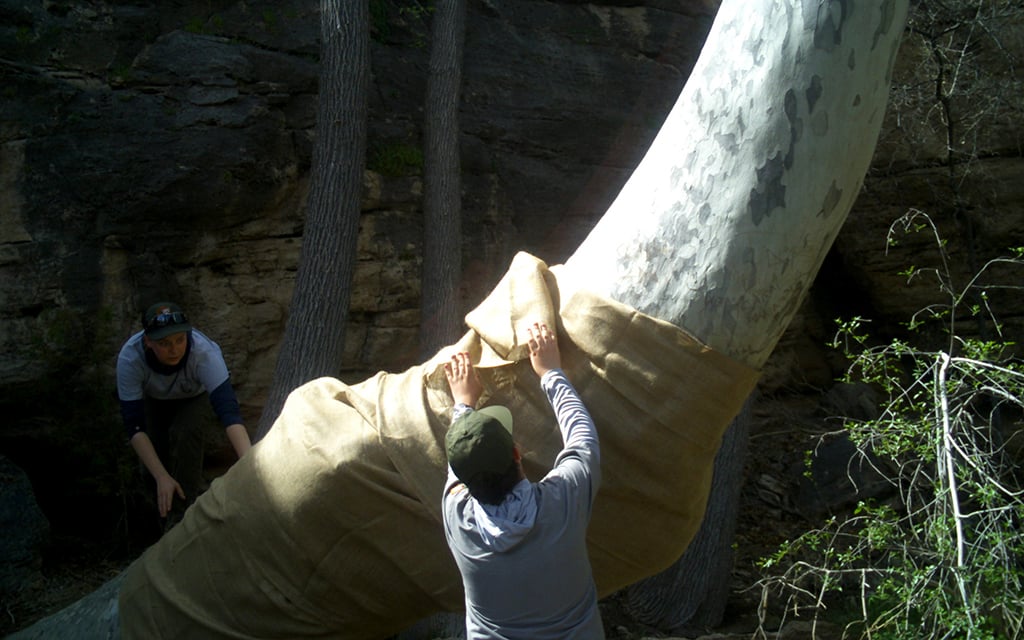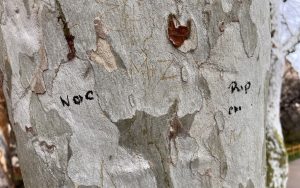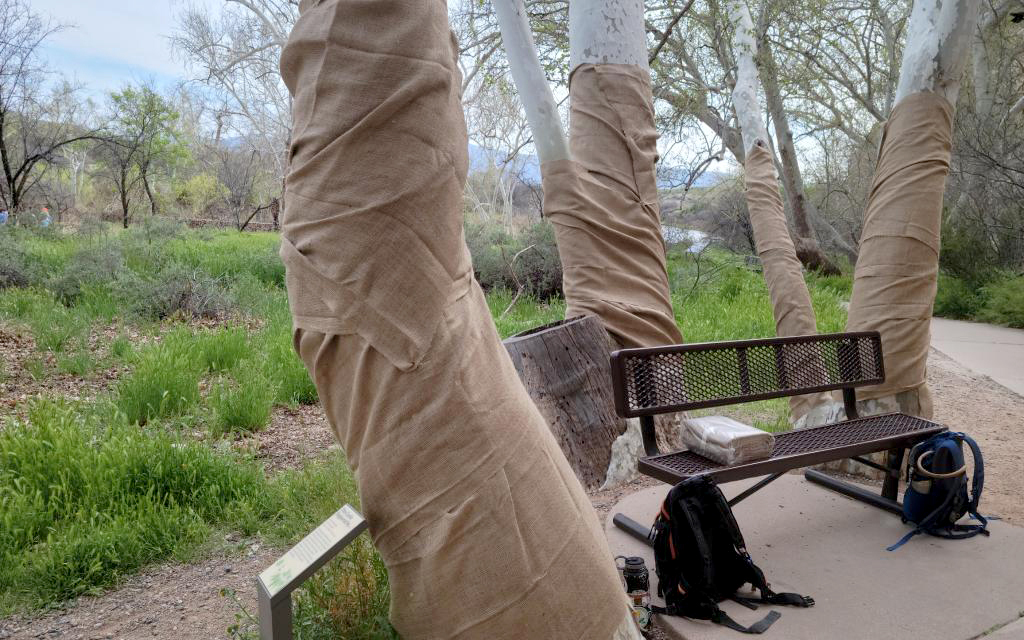
National Park Service employees at Montezuma Castle National Monument wrap an Arizona sycamore tree with burlap. (Photo courtesy Montezuma Castle National Monument)
PHOENIX – Montezuma Castle National Monument is wrapping trees to prevent vandalism.
In March, natural resources technicians at the national monument used burlap to cover the bark of six Arizona sycamore trees along public trails at Montezuma Castle. Portions of the bark were written and carved on. Many of the carvings included the year, which made it obvious there had been a recent increase in incidents.
But national park vandalism isn’t just a problem at Montezuma Castle – it’s been an issue many Arizona national park sites have dealt with.
While incidences of defaced trees have increased at Montezuma Castle in the past few years, the method of wrapping them in burlap has never been used there, according to a representative from the monument.
Rangers chose to cover the trees in burlap because it is resistant to cutting and can be used through the warm spring and summer months without risking the health of the trees. The burlap is intended to give the trees a chance to recover from their injuries and to enhance visitor experience by covering graffiti on the bark.
Before they resorted to burlap-wrapping, Montezuma Castle National Monument rangers had posted signs near the trees and stationed volunteers to speak with visitors to discourage tree defacement and explain its harm. The trees, however, remained frequently carved, not leaving enough time for the old carvings to shed carved bark before new ones were added.

Markings on a tree located at Montezuma Castle National Monument. (Photo courtesy Montezuma Castle National Monument)
The sign on each wrapped tree reads: “This tree has been vandalized. Defacing trees is vandalism. Please help us preserve and protect our nation’s unique natural and cultural heritage. Do not write on or carve the trees.”
Defacement and vandalism of trees at the site would be considered a federal misdemeanor, which could be punishable by six months in jail or a $5,000 fine.
In the past, carvings were few and small enough that natural resources technicians at the park could safely fill them in with wood glue and sawdust. If that method were used to cover the current extent of the damage, however, it would harm the tree’s health, according to the monument representative.
The National Park Service, which manages Montezuma Castle National Monument, investigates crimes at national parks through its National Park Service Investigative Services Branch. The branch has been successful at preventing vandalism at a different Arizona park – Saguaro National Park.
Saguaro National Park spokesperson Cam Juárez said the park’s most recent act of vandalism was in 2016, when someone cut down eight or nine saguaro cactuses. Juárez said that visitors to the park are discouraged from vandalism because they know it has consequences, such as fines.
“We have an amazing law enforcement team here,” Juárez said of the park.
Juárez said, however, there is not enough staff to have investigative units at every national park in Arizona, and some struggle with security.
“I think our law enforcement teams … are definitely understaffed, and that’s a problem nationwide, and I think they all do their best to interact within current units but also interact with local law enforcement,” Juárez said.
Therefore, the parks have to trust the public to act responsibly, Juárez said.
“It’s impossible to close off a national park. … It’s hard to keep people out,” he said. “We’re just hoping that people do the right thing.”

Multiple Arizona sycamore trees are wrapped in burlap at Montezuma Castle National Monument. (Photo courtesy Montezuma Castle National Monument)
The park rangers tend to be effective at preventing smaller acts of vandalism, such as breaking into cars or stealing personal items, Juárez said.
“The community is definitely part of that process in protecting our natural and cultural resources,” Juárez said.
Richard Ullmann, program manager for visitor services for Flagstaff Area National Monuments, said visitors play the largest role in mitigating park vandalism.
“Majority of the people understand and do the right thing,” Ullmann said. “We assume good intentions when visitors come to the national parks.”
Educating people about the harmful effects of vandalism is crucial to preventing it in the future, Ullmann said. If a person is caught vandalizing a national park, Ullmann said he hopes to give them an opportunity to learn and to demonstrate better behavior.
“In the case of an act of vandalism, it’s an opportunity to help that individual or that person or group of people do something different next time,” Ullmann said. “It’s an educational opportunity.”
